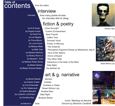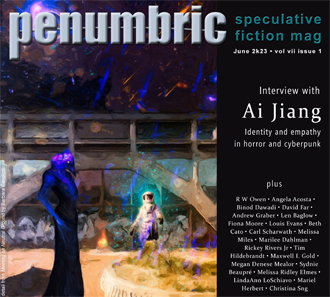From the Editor
by
Jeff Georgeson
previous next


full contents
interview
Ai Jiang
From the Editor
by
Jeff Georgeson
previous

full contents
next

interview
Ai Jiang
From the Editor
by
Jeff Georgeson
previous next


full contents
interview
Ai Jiang
previous

full contents
next

interview
Ai Jiang
From the Editor by Jeff Georgeson
From the Editor
by Jeff Georgeson
Is the rise of AI heralding the extinction of humans?
This is the headline (or gist thereof) of multiple articles in the last week or so, telling us that so-called “experts” are all warning that the rise of AI will lead to an existential threat to human beings—basically telling us that SkyNet is coming, terminators will terminate us, and the sky will fall.
While there is definitely something wrong with the sky (climate change brought to you by humans and not AI), this kind of unholy union between experts and the media to prophecy doom is wholly irresponsible, especially when governments around the world would like nothing better than to ignore the actual problems of climate change and war in order to focus on something scifi instead. Especially something where decades of science fiction stories have laid the general groundwork for AI being another Other we will have to fight, where the public can be easily distracted, where we already hear daily of the stunning advances of ChatGPT and various AI art programs and the “AI” helping social media giants (and governments) spy on us to the extent of making “privacy” an archaic word only found in the dictionary.
There are certainly a host of problems with ChatGPT—mostly to do with how humans are going to use it, not the other way round. The same with art AI—the humans using it are causing the problems; the AI itself isn’t the kind of AI that becomes self-aware and then decides that human beings are one big deepfake that needs to be wiped from the face of the Earth. And the AI used to erode privacy is a kind of advanced data analytics, created by and used by humans, not by a self-aware AI net to rule the world.
We are still years away from creating anything really self-aware. We can mimic a certain amount of awareness, and we’re getting better at that all the time, but we aren’t even close to creating an artificial intelligence that is genuinely able to understand what it is doing, what it is saying and why. If we put imperfect computer systems in charge of nuclear weapons, that will be on us, not on some AI boogeyman. If we misprogam a climate model, if we use analytics to enable strongmen and fascists to control us, that’s not the secret plot of some AI somewhere—that’s on us. If we allow some political party to scare us into giving away all our rights and freedoms, if we want to believe that all education is a liberal plot to—gasp—educate us, and that Ignorance is Strength—that’s on us, as opposed to some electronic overlord. There are plenty of human beings I’d be far more afraid of giving nukes to than an AI, and the AI doesn’t even exist.
In this issue we interview Ai Jiang, a prolific author of cyberpunk (most recently I am AI) and horror (most recently Linghun). We spoke about ChatGPT and AI, certainly, but mostly about the very human issues of identity and empathy, of culture and difference and how we treat other human beings and how that makes us feel, and how one writes about these things. This is reflected as well in the rest of the issue, whether the works be science fiction, fantasy, or horror, and is displayed in our cover by Barbara Candiotti, Meeting on Neutral Ground.
Have a wonderful June, a great summer, and we’ll see you again in August. SkyNet permitting.
Jeff Georgeson
Managing Editor
Penumbric Speculative Fiction Magazine











